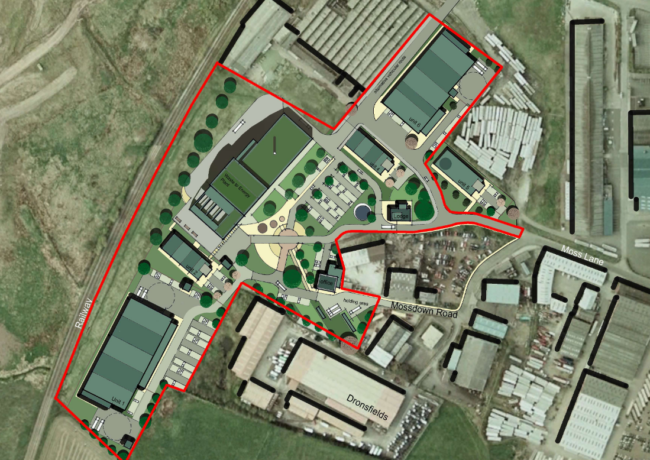Oldham rejects plan for £100m Royton energy-from-waste plant
Oldham Council’s planning committee has voted 13 to one to reject an application for six warehouses, an office, and an energy-from-waste plant on an industrial site in Royton, despite the developer claiming investment interest from Canadian and Norwegian pension funds.
The outline planning application by The Connell Group and Woodhouse Properties includes an office block, six industrial units, and an energy-from-waste plant which would generate between 10 and 11 megawatts of power to support local businesses.
Parts of the site alongside the Manchester to Rochdale Metrolink line are currently used as a waste recycling business, but is designated as open land under Oldham’s local plan.
Connell and Woodhouse had argued the scheme would create up to 200 construction jobs during the development phase, and around 50 jobs when complete.
The application was due to be discussed by the planning committee in February but was deferred to allow Connell and Woodhouse to provide more information to planners and statutory consultees.
However, planning officers continued with their recommendation that the project be refused, based on highways issues, environmental impacts, and the area’s designation as Other Protected Open Land under Oldham’s local plan.
Bodies that had objected to the plans included the Environment Agency, Transport for Greater Manchester, and Oldham’s highways team. None of these withdrew their objections despite the scheme’s deferral at the February committee.
Speaking at yesterday’s planning committee, the scheme’s planning consultant Alan Chorlton said the site was “a visual and environmental mess” and said the applicants would continue to work with the council and consultees “with a view to agreeing a way forward”.
“We have an opportunity to clean up this problem site, reduce the waste miles travelled, generate electricity and provide cheap heat for the surrounding businesses in a high-quality building,” he said. “In our view, the development is good for the site and good for Oldham.”
He also confirmed there were three major parties eyeing investment in the site: one from a Canadian pension fund; another approach through Siemens which is understood to be backed by Chinese money; and another approach from a Norwegian fund looking to invest in the UK.
However, councillors voted to reject the proposals nearly unanimously, with only one member of the committee voting against planning officers’ recommendation, with the committee chair Steven Bashforth arguing it was “just not possible to support the application at this stage”.
Planners had argued the project would “have a high adverse impact on the character of the Beal Valley Other Protected Open Land designation,” which would not be “adequately mitigated enough to lessen the impact”, and added the application from Connell and Woodhouse was “premature”, given the designation of the site as OPOL.
“The correct process would be for a review of the OPOL designations to be carried out and for the GMSF to be published in due course before determining whether or not the site in question is suitable for development.”
Planners said the submission of the application in outline form “fundamentally undermines the case of the application” as it was unclear what the development’s final scale would be.
“Any development of the area needs to be comprehensively masterplanned and take into account the considerations of the landscape in order to mitigate the visual and ecological impacts associated with development in this area of OPOL.
“The current proposal does not do this, and as such, cannot be supported in its current form”.
Planners also concluded the application did not take into account local flooding impacts outside the site’s boundary; that it not had not demonstrated there would not be “severe impact” on the local highways network; and that existing access to the site “would not accommodate the type and volume of traffic that will be generated” by the project.
There were also concerns raised over the scheme’s Environmental Impact Assessment, which planners said “failed to demonstrate” that the project “would not have a detrimental impact on the surrounding area’s air quality, noise, and odours from the processes proposed to be undertaken on the site”.
The professional team on the project also includes SCP as transport planner; REC as air quality consultant; and Nicol Thomas as architect. A ground investigation report for the scheme was prepared by Demeter Environmental.




